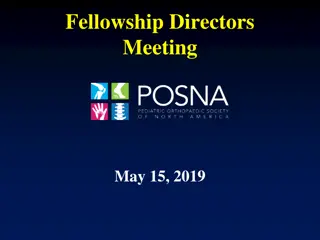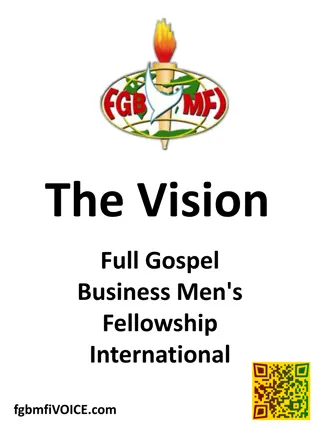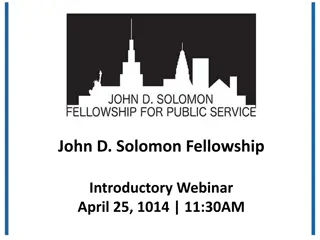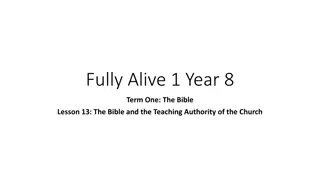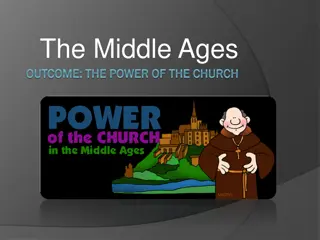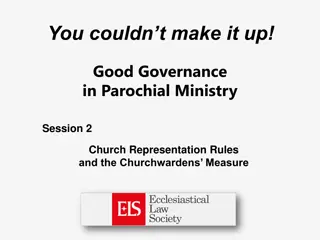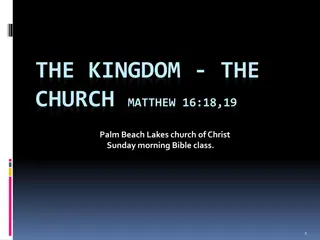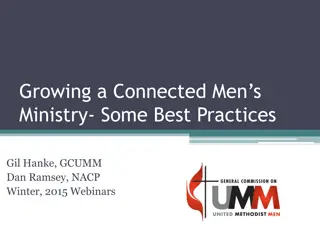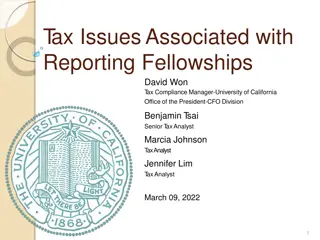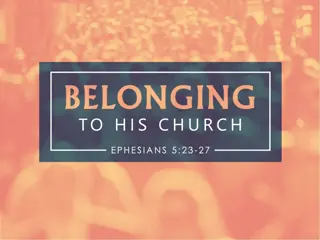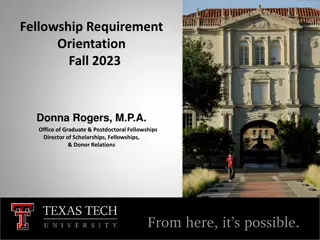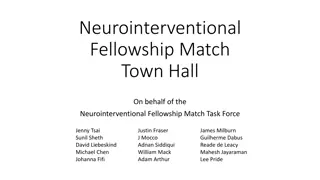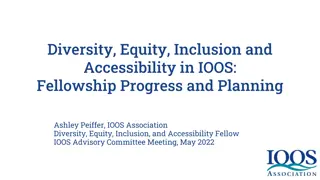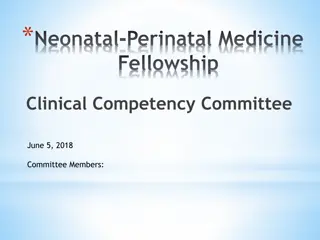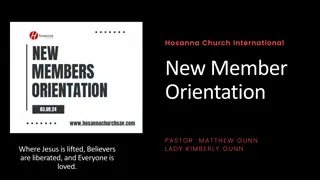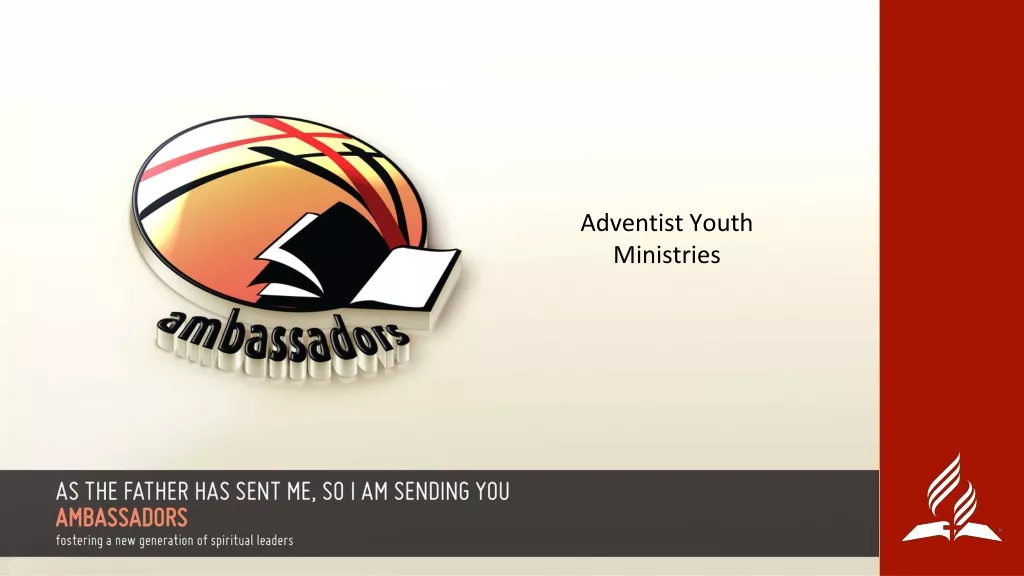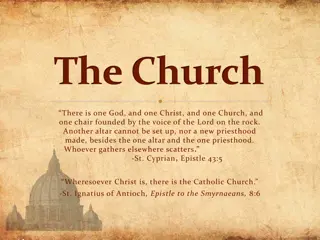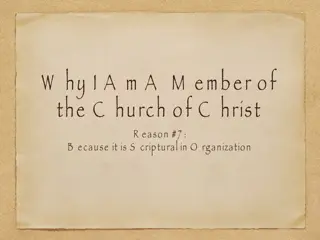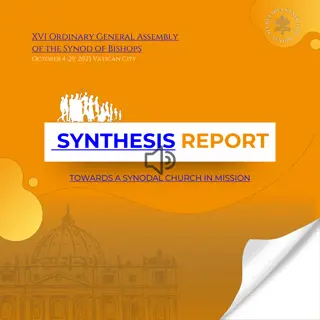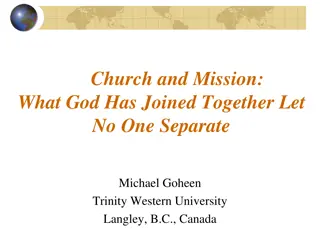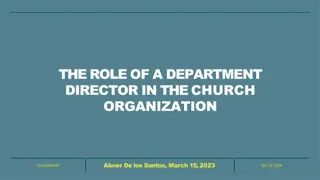Understanding Fellowship in the Context of Church Activities
This article explores the concept of fellowship within the context of church activities such as social meals, fellowship halls, and kitchens. It delves into New Testament references to fellowship, discussing its significance and implications for the church's program of work. The question of whether there is New Testament authority for a local church to plan and provide resources for social activities is also examined through biblical passages and analysis.
Download Presentation

Please find below an Image/Link to download the presentation.
The content on the website is provided AS IS for your information and personal use only. It may not be sold, licensed, or shared on other websites without obtaining consent from the author. Download presentation by click this link. If you encounter any issues during the download, it is possible that the publisher has removed the file from their server.
E N D
Presentation Transcript
FELLOWSHIP HALLS, KITCHENS, SOCIAL MEALS AND THE CHURCH (Part 3)
FELLOWSHIP HALLS, KITCHENS, SOCIAL MEALS AND THE CHURCH There are some who center their arguments in favor of such things on the word fellowship. Since the church is supposed to have fellowship, and since the eating of meals together constitutes fellowship, then the Lord must approve of them (That s the argument made by some).
THE QUESTION WE ARE TRYING TO ANSWER Is there N.T. authority for a local church to plan and provide resources for social activities in its program of work? Is there a command? Is there an example? Is there a passage that implies that it should be done?
OCCURRENCES OF THE WORD FELLOWSHIP IN THE NEW TESTAMENT And they continued steadfastly in the apostles' doctrine and fellowship (koinonia), in the breaking of bread, and in prayers. (Acts 2:42; NKJV) God is faithful, by whom you were called into the fellowship (koinonia) of His Son, Jesus Christ our Lord. (1 Corinthians 1:9; NKJV) Rather, that the things which the Gentiles sacrifice they sacrifice to demons and not to God, and I do not want you to have fellowship (koinonos) with demons. (1 Corinthians 10:20; NKJV) Do not be unequally yoked together with unbelievers. For what fellowship (metoche) has righteousness with lawlessness? And what communion has light with darkness? (2 Corinthians 6:14; NKJV)
OCCURRENCES OF THE WORD FELLOWSHIP IN THE NEW TESTAMENT imploring us with much urgency that we would receive the gift and the fellowship (koinonia) of the ministering to the saints. (2 Corinthians 8:4; NKJV) and when James, Cephas, and John, who seemed to be pillars, perceived the grace that had been given to me, they gave me and Barnabas the right hand of fellowship (koinonia), that we should go to the Gentiles and they to the circumcised. (Galatians 2:9; NKJV) and to make all see what is the fellowship (koinonia) of the mystery, which from the beginning of the ages has been hidden in God who created all things through Jesus Christ (Ephesians 3:9; NJKV) And have no fellowship (sugkoinoneo) with the unfruitful works of darkness, but rather expose them. (Ephesians 5:11; NKJV) for your fellowship (koinonia) in the gospel from the first day until now, (Philippians 1:5)
OCCURRENCES OF THE WORD FELLOWSHIP IN THE NEW TESTAMENT Therefore if there is any consolation in Christ, if any comfort of love, if any fellowship (koinonia) of the Spirit, if any affection and mercy, (Philippians 2:1; NKJV) that I may know Him and the power of His resurrection, and the fellowship (koinonia) of His sufferings, being conformed to His death, (Philippians 3:10: NKJV) that which we have seen and heard we declare to you, that you also may have fellowship (koinonia) with us; and truly our fellowship (koinonia) is with the Father and with His Son Jesus Christ. (1 John 1:3; NKJV) If we say that we have fellowship (koinonia) with Him, and walk in darkness, we lie and do not practice the truth. 7 But if we walk in the light as He is in the light, we have fellowship (koinonia) with one another, and the blood of Jesus Christ His Son cleanses us from all sin. (1 John 1:6-7; NKJV)
koinonia (KOY-NOHN-EE'-AH); AS IT IS TRANSLATED IN OTHER PLACES while, through the proof of this ministry, they glorify God for the obedience of your confession to the gospel of Christ, and for your liberal sharing (koinonia) with them and all men (2 Corinthians 9:13; NKJV) that the sharing (koinonia) of your faith may become effective by the acknowledgment of every good thing which is in you in Christ Jesus. (Philemon 1:6; NKJV) But do not forget to do good and to share (koinonia), for with such sacrifices God is well pleased. (Hebrews 13:16; NKJV)
koinonia (KOY-NOHN-EE'-AH); AS IT IS TRANSLATED IN OTHER PLACES The cup of blessing which we bless, is it not the communion (koinonia) of the blood of Christ? The bread which we break, is it not the communion of the body of Christ? (1 Corinthians 10:16; NKJV) Do not be unequally yoked together with unbelievers. For what fellowship has righteousness with lawlessness? And what communion (koinonia) has light with darkness? (2 Corinthians 6:14; NKJV) The grace of the Lord Jesus Christ, and the love of God, and the communion (koinonia) of the Holy Spirit be with you all. Amen. (2 Corinthians 13:14; NKJV)
koinonia (KOY-NOHN-EE'-AH); AS IT IS TRANSLATED IN OTHER PLACES For it pleased those from Macedonia and Achaia to make a certain contribution (koinonia) for the poor among the saints who are in Jerusalem. (Romans 15:26; NKJV)
KOINONOS (KOY-NO-NOS); AND HOW IT TRANSLATED IN OTHER PLACES Rather, that the things which the Gentiles sacrifice they sacrifice to demons and not to God, and I do not want you to have fellowship (koinonos) with demons. (1 Corinthians 10:20; NKJV) and say, 'If we had lived in the days of our fathers, we would not have been partakers (koinonos) with them in the blood of the prophets. (Matthew 23:30; NKJV) Observe Israel after the flesh: Are not those who eat of the sacrifices partakers (koinonos) of the altar? (1 Corinthians 10:18; NKJV) And our hope for you is steadfast, because we know that as you are partakers (koinonos) of the sufferings, so also you will partake of the consolation. (2 Corinthians 1:7; NKJV) Also see 1 Peter 5:1 and 2 Peter 1:4
KOINONOS (KOY-NO-NOS); AND HOW IT TRANSLATED IN OTHER PLACES and so also were James and John, the sons of Zebedee, who were partners (koinonos) with Simon. And Jesus said to Simon, "Do not be afraid. From now on you will catch men." (Luke 5:10; NKJV) If anyone inquires about Titus, he is my partner (koinonos) and fellow worker concerning you. Or if our brethren are inquired about, they are messengers of the churches, the glory of Christ. (2 Corinthians 8:23; NKJV) If then you count me as a partner (koinonos), receive him as you would me. (Philemon 1:17; NKJV)
KOINONOS (KOY-NO-NOS); AND HOW IT TRANSLATED IN OTHER PLACES partly while you were made a spectacle both by reproaches and tribulations, and partly while you became companions (koinonos) of those who were so treated; (Hebrews 10:33; NKJV)
METOCHE (MET-OKH-AY); AS IT IS TRANSLATED Do not be unequally yoked together with unbelievers. For what fellowship (metoche) has righteousness with lawlessness? And what communion has light with darkness? (2 Corinthians 6:14; NKJV) This word is not used anywhere else is in the N. T., but the verb form is used in Hebrews 2:14, where it translated shared.
SUGKOINONEO (SOONG-KOY-NO-NEH'-O); AS IT IS TRANSLATED And have no fellowship (sugkoinoneo) with the unfruitful works of darkness, but rather expose them. Eph 5:11 (NKJV) Found in 2 other places: Philippians 4:14 (shared) and Revelation 18:4 (share).
WHAT DO THESE PASSAGES TELL US ABOUT THE MEANING OF FELLOWSHIP? Where is the Greek word koinonia, or these other related words, used to refer to purely social activities? Suppose we did find a passage where fellowship was used in connection with social activities, such as eating a meal? Would that prove anything? You would still have to prove that it is an activity assigned to the church. Whatever one may find, it cannot contradict the plain words of 1 Corinthians 11: Do you not have houses to eat and drink in? (Verse 22); But if anyone is hungry, let him eat at home (Verse 34).
FELLOWSHIP HALLS, KITCHENS, SOCIAL MEALS AND THE CHURCH You cannot find the authority for a local church, as a part of its program of work, planning and providing materials for social activities in connection with the word fellowship in the Bible because it doesn t use the word fellowship for that.
1 TIMOTHY 5:16 (NKJV) If any believing man or woman has widows, let them relieve them, and do not let the church be burdened, that it may relieve those who are really widows.
OUR PROBLEM: SIN GOD S SOLUTION: JESUS CHRIST Sin is explained and identified in the Bible (1 John 3:4; 5:17; James 4:17; Romans 14:5,23). Sin separates you from God (Isaiah 59:1-2) and dooms you to eternal separation in hell (Matthew 25:41). You cannot save yourself from sin by your own efforts (Matthew 19:23-26; Titus 3:4-7). God's amazing grace makes salvation from sin possible for you but only through Jesus Christ (Isaiah 53:5; Hebrews 2:9; Ephesians 1:7).
ONLY THOSE SINNERS WHO OBEY GOD WILL RECEIVE SALVATION FROM SIN (MT. 7:21; HEB. 5:9). You must hear/read the gospel of Jesus Christ (Rom. 10:14,17). You must believe in Jesus Christ (Acts 16:30-33). You must repent of all of your past sins (Acts 17:30-31). You must confess your faith in Jesus Christ (Acts 8:35-37). You must be baptized (immersed in water) into Jesus Christ (Acts 8:38; 22:16). After becoming saved, you must live a faithful/righteous life to remain saved (1 Tim. 4:16; 1 Jn. 1:7). Eternal life in heaven awaits only those who are faithful/righteous (1 Pet. 1:3-5; Mt. 25:34).




